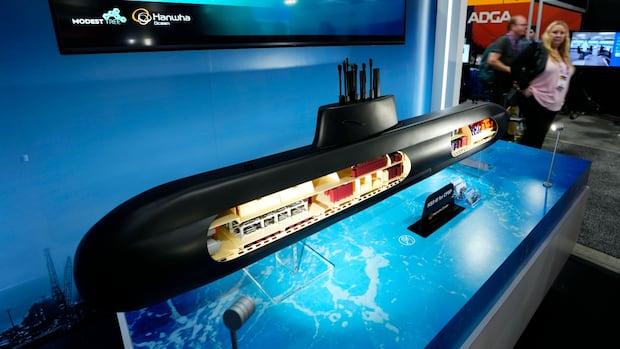Competition to build Canada’s new fleet of submarines kicked up a notch Wednesday with the South Korean bidder reiterating its pledge to deliver more boats faster than its German rival.
Hanwha Ocean Ltd., in a statement, expressed its appreciation for the Liberal government’s decision this week to narrow the field of bidders to two shipyards.
The other competitor in the program, potentially worth more than $20 billion, is ThyssenKrupp Marine Systems (TKMS) in Kiel, Germany.
The announcement of the downselecting — from four to two bidders — was made by Prime Minister Mark Carney as he met German Chancellor Friedrich Merz in Berlin on Tuesday.
Later that day, Carney toured the TKMS shipyard and pledged to visit the South Korean facility this fall.
Hanwha Ocean and TKMS were picked because expressions of interest from both companies “met the bar” in terms of the capabilities and the kind of submarine required by the Canadian navy, Carney said.
The South Korean builder is pitching the KSS-III and submitted a detailed, unsolicited proposal to the Canadian government in early March, just prior to the last federal election.
In its statement, Hanwha Ocean underlined that, with its partner Hyundai Heavy Industries Ltd., Canada can get its fleet more quickly and potentially save money.
“Hanwha can deliver four KSS-III CPS to fully replace Canada’s current Victoria-class fleet before 2035 if on contract in 2026,” the company said.
Canada is expecting its chosen shipbuilder to deliver the first sub by 2035.
Hanwha Ocean estimates that an earlier retirement of Canada’s aging fleet of subs would result in about $1 billion in savings “on maintenance and support costs.”
Competing timelines
Germany’s TKMS said, in its presentation to Carney and members of his cabinet in Kiel on Tuesday, that it could supply a submarine by 2034 and a second one by 2037.
The Korean firm countered in its statement on Wednesday, saying not only could it deliver the first four before the retirement of the old fleet, but the additional eight could be delivered at a rate of one per year — meaning the entire fleet of 12 subs could be ready by 2043.
“No other option can come anywhere close to this delivery schedule,” the Hanwha Ocean statement said.
As Ottawa rethinks U.S. weapons contracts, South Korean arms manufacturers want to resupply Canada’s depleted military with everything from howitzers to submarines. CBC’s Murray Brewster got exclusive access to one company angling to become Canada’s new high tech arsenal.
The Liberal government has made it a priority to diversify Canada’s trading relationships, including bolstering the economy through rebuilding the defence industrial base.
Hanwha Ocean appealed to that aspect by saying it was committed to “establishing a robust and long-term partnership” with Canada’s government and industry “in the areas of defence, space, sustainable energy and critical minerals.”
Carney said he was committed to an equitable, transparent selection process. A senior government official, accompanying the prime minister on his European trip, said the federal cabinet is debating whether to request full, more detailed proposals — or simply begin negotiations with a preferred bidder.
A decision on which company will get the contract is not expected until next year at the earliest.
Defence Minister David McGuinty said there are a lot of factors to consider and delivery schedule is among them.
“I don’t know if it’ll be the determining one,” McGuinty said Wednesday while visiting Canadian troops deployed on the NATO mission in Latvia.

“Timeliness will be a factor; interoperability will be another. Use in terms of Canadian priorities, for example in the Arctic, will be another; industrial benefits for Canada will be prominent in whatever proposals come forward.”
One of the reasons TKMS can only potentially deliver two or three submarines in the next dozen years is that it’s already engaged in building 12 boats for Germany and Norway.
South Korean defence experts point out that Europe is still figuring out rearmament after more than 30 years of mothballed defence production lines.
Kayla Mijung Kim, of the Korean Institute for Industrial Economics and Trade, told CBC News in Seoul last spring that the supply chain in Europe is weak.
“Germany and France, for example, want to make their own weapons systems, but they’re constrained,” she said. “They cannot procure all the defence components they need from European countries. I think they need some time.”
Production bottlenecks — an aspect that starkly presented itself as countries rushed to arm Ukraine — have driven some NATO allies to look elsewhere.








